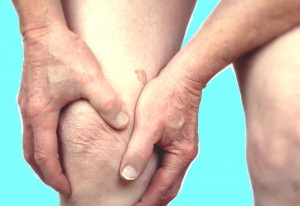 The simplest answer to this question? Maybe. Perhaps not the answer you were hoping for, but the fact is that, although knee pain doesn’t necessarily come with age, it is true that a large part of older folks suffer from it. It’s also true that knee pain tends to worsen with age. But does it have to be this way? Absolutely not. There are steps you can take to minimize your chances of developing knee pain as you age. For instance, are you carrying a little extra weight? Did you know that for every extra pound you carry on your body, you’re adding 4 pounds of extra weight on your knees? It’s true! In other words, if you’re just 10 pounds above your ideal body weight, you’re adding 40… that’s right, four – zero… extra pounds of pressure to your knees! Pretty sizable, when it’s put that way, isn’t it? Following is more information on knee pain and aging from knee replacement specialists in New Jersey that will help you better understand measures you can take to prevent knee pain as you move into middle age and beyond.
The simplest answer to this question? Maybe. Perhaps not the answer you were hoping for, but the fact is that, although knee pain doesn’t necessarily come with age, it is true that a large part of older folks suffer from it. It’s also true that knee pain tends to worsen with age. But does it have to be this way? Absolutely not. There are steps you can take to minimize your chances of developing knee pain as you age. For instance, are you carrying a little extra weight? Did you know that for every extra pound you carry on your body, you’re adding 4 pounds of extra weight on your knees? It’s true! In other words, if you’re just 10 pounds above your ideal body weight, you’re adding 40… that’s right, four – zero… extra pounds of pressure to your knees! Pretty sizable, when it’s put that way, isn’t it? Following is more information on knee pain and aging from knee replacement specialists in New Jersey that will help you better understand measures you can take to prevent knee pain as you move into middle age and beyond.
Categories of knee pain
Like many other types of pain, knee pain is divided into 3 main categories. These include chronic or repetitive use; acute injury; and medical condition.
Chronic pain/pain from repetitive use
Chronic knee pain is pain that occurs regularly and often persists for long periods of time. Knee pain that occurs from repetitive use can be chronic, such as occurs with a particular type of occupation, for example, in sports or construction work. Types of chronic knee pain include patellar syndrome, bursitis, and tendinitis. These tend to be much more prevalent in the elderly.
Acute pain resulting from injury
Acute knee pain is pain that often accompanies a sudden injury; such is with a broken leg, broken hip, or a torn ligament. Although acute pain from injury can occur to anyone at any age, it’s more prolific in older folks due to such medical conditions as osteoarthritis, which is a degenerative condition that causes loss of bone mass and density.
Pain resulting from medical condition
Many medical conditions can bring with them pain that develops in the knees, such as with arthritis or even with an infection.
Factors that can lead to knee pain
Naturally, injuries occurring from such events as a car accident or a skiing accident can lead to knee pain. Additionally, medical conditions can also cause knee pain. But these aren’t the only situations that can lead to pain occurring in the knee, especially as the years pile up in the rearview mirror. Oftentimes, simply living an unhealthy lifestyle can lead to knee pain. Other factors that can lead to knee pain as we age include medical conditions such as osteoarthritis. The Centers for Disease Control reports that nearly 35 percent of all Americans over the age of 65 suffer from osteoarthritis, which is a condition that can lead to brittle bones and significant knee pain. Another factor that can lead to knee pain as we get older is the fact that our muscles tend to shrink, as much as 40 percent from age 20 to age 60. This shrinkage leads to loss of strength, which can result in increased burden on the structures of the knees.
What you can do about knee pain
Leading a healthy lifestyle can reduce or even eliminate the incidence of knee pain. This includes weight reduction for those who are carrying extra pounds; getting on a regular exercise program not only to reduce weight, but also for those who aren’t as active as they should be; and eating a nutritious diet that includes foods that are rich in vitamins and minerals such as calcium and vitamin D. And, if you’re over 50 and you’re suffering from knee pain, talk to a healthcare provider for counseling, diagnosis, and possible treatment.
Knee pain can be debilitating, especially for people aged 50 and over. Oftentimes, folks who suffer from knee pain have limited mobility, which then leads to limited activity, diminished health, and diminished happiness in life. The good news, though, is that aging doesn’t have to include knee pain. With just a few minor changes to your lifestyle, you have a pretty good chance of avoiding knee pain altogether, regardless of your age.

